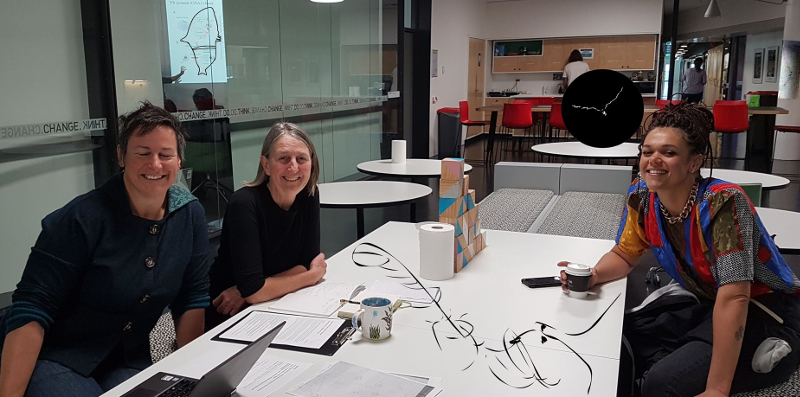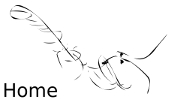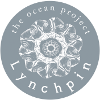Living Data
Voices from the Southern Ocean/
Index
Disclaimers, Copyrights and Citations
Voices from the Southern Ocean/Index 2019 2020 2021 2022
The songlines are such an important part of our mental and spiritual structure.
They are lines of energy that run between places, animals and people.
Uncle Max Dulumunmun Harrison, 2009
Living Data for Children:
Voices from the Southern Ocean

L-R: Chriss Bull, Lisa Roberts and Maddison Gibbs
at University of Technology Sydney (UTS), July 2019. Photo: Anon
A Living Data project for children is evolving.
Animations, installations, performances and picture books will give voice to ocean creatures and their relatives on land. An animated interactive web site will track the creatures' journeys and invite human responses. Algae, Krill, Fish, Snake, Bird and Whale will embark on an expedition from Antarctica to Australia. They will explore their relationships and how they co-evolved through time and space with natural cycles of global climate change driven by Antarctic sea ice. They will reveal connections between health and wellbeing of individuals, communities and the planet. They will reveal some ancient wisdom on forgiveness, care for country and conflict resolution.
Whale will lead and narrate a journey from the sea and then onto land, as in the Whale Dreaming stories of the Yuin and Gumbaynggirr peoples. That journey will reflect how Western scientists understand the evolution of the whale: The whale came from the sea, evolved on land into an almost wolf-like organism and eventually became amphibious and went back into the ocean to become the whales we see today. All mammals evolved from the ocean to be air-breathing organisms.
Walks on country, workshops and travelling shows will be key to developing the stories and for assessing their impacts on young people. The project has evolved from conversations this year with Barkindji artist Maddison Gibbs, at the Australian Antarctic Division (AAD), Victorian College of the Arts (VCA) and University of Technology Sydney (UTS), and from involvement in the Ngadhuri-nya (To care for) study associated with the NSW Child Development Study. The project will culminate in 2022 to coincide with publication of the International Panel of Climate Change (IPPC) Report.
As project lead I acknowledge the risk of misrepresentation in the story telling, and so we are guided by Aboriginal Elders, Western scientists, Indigenous ecological scientists and others with Indigenous ecological knowledge (IEK).
Dr Lisa Roberts 17 July 2019
CO-CREATORS
KNOWLEDGE HUBS
Algae, Krill, Fish, Snake, Bird, Whale
FOUNDATION WORK
























